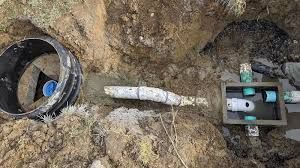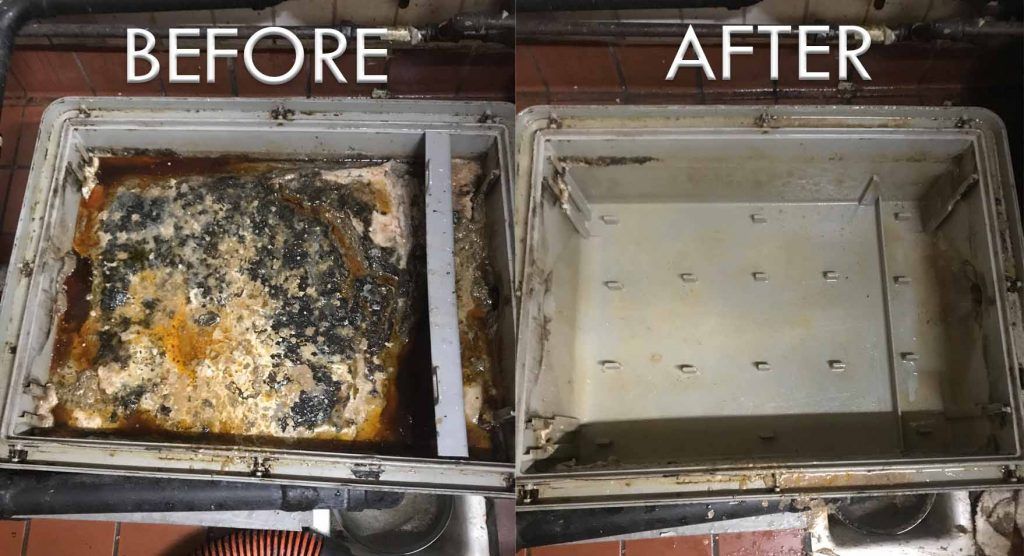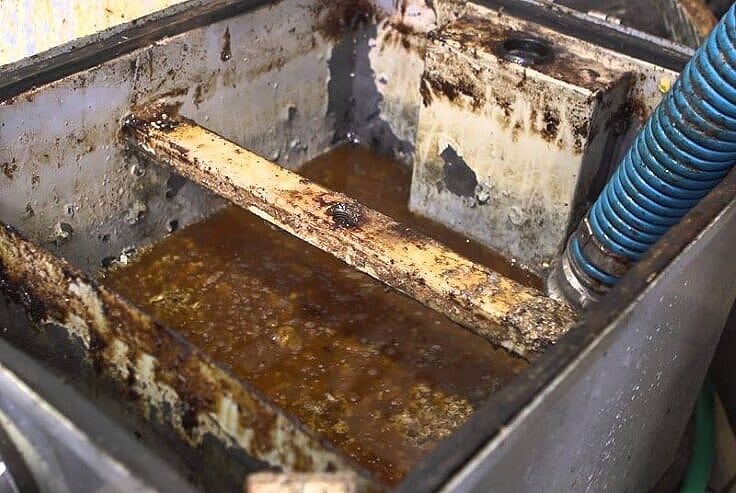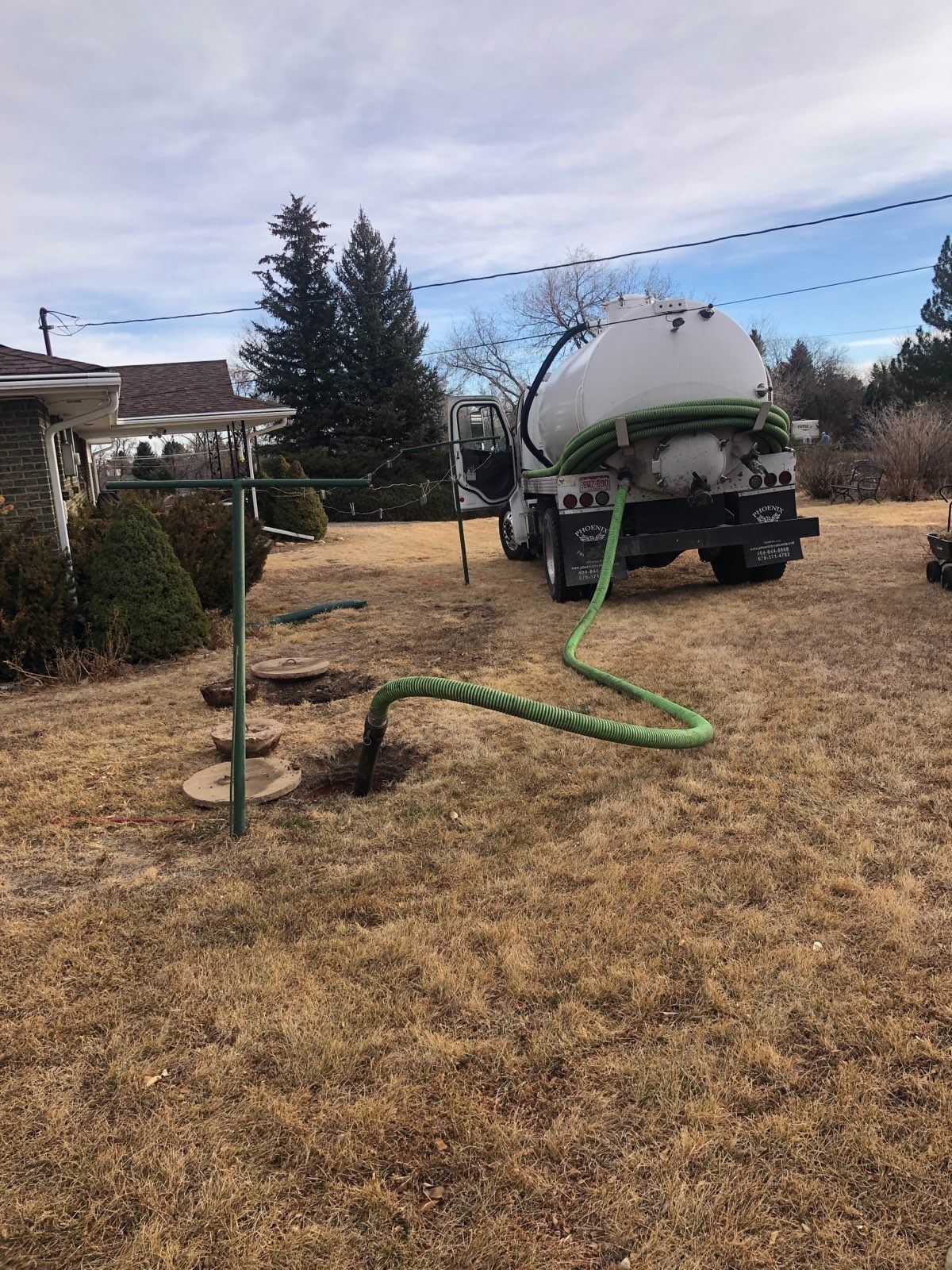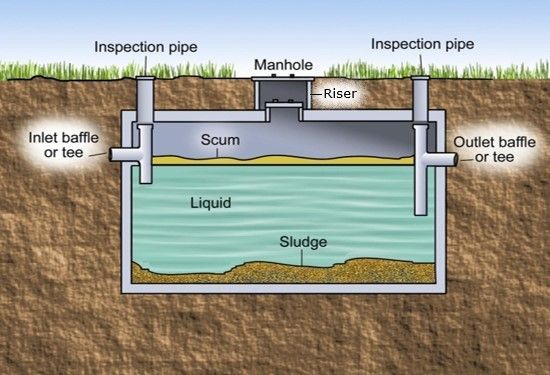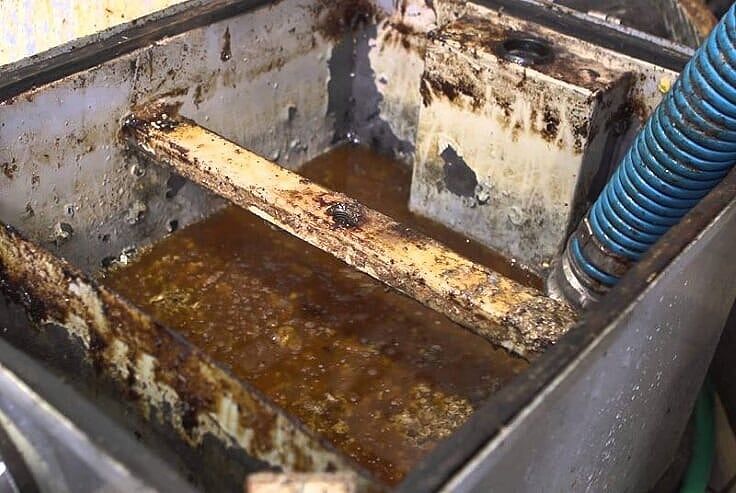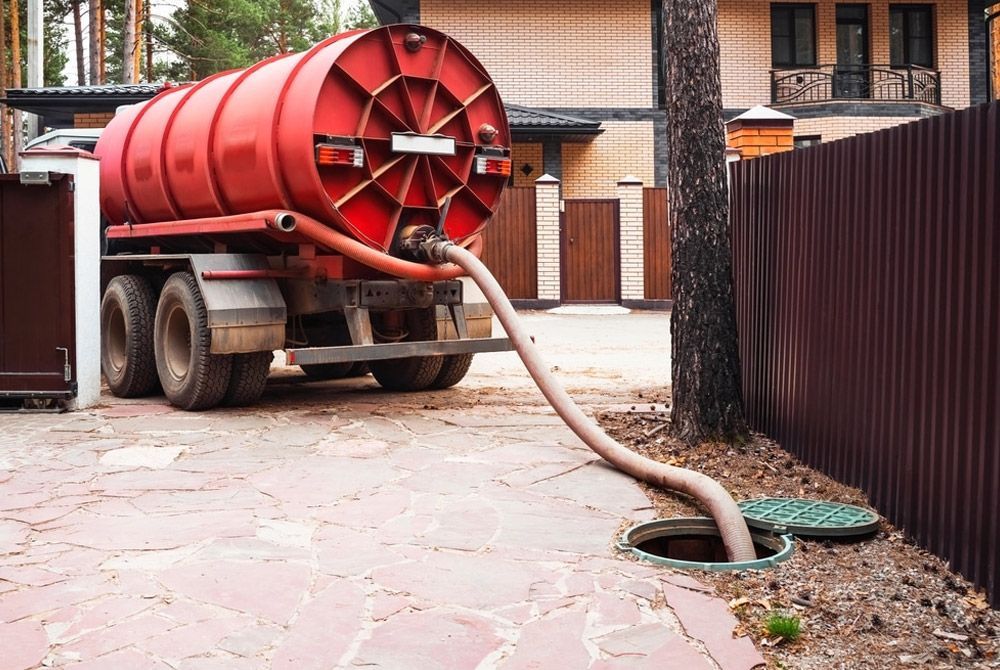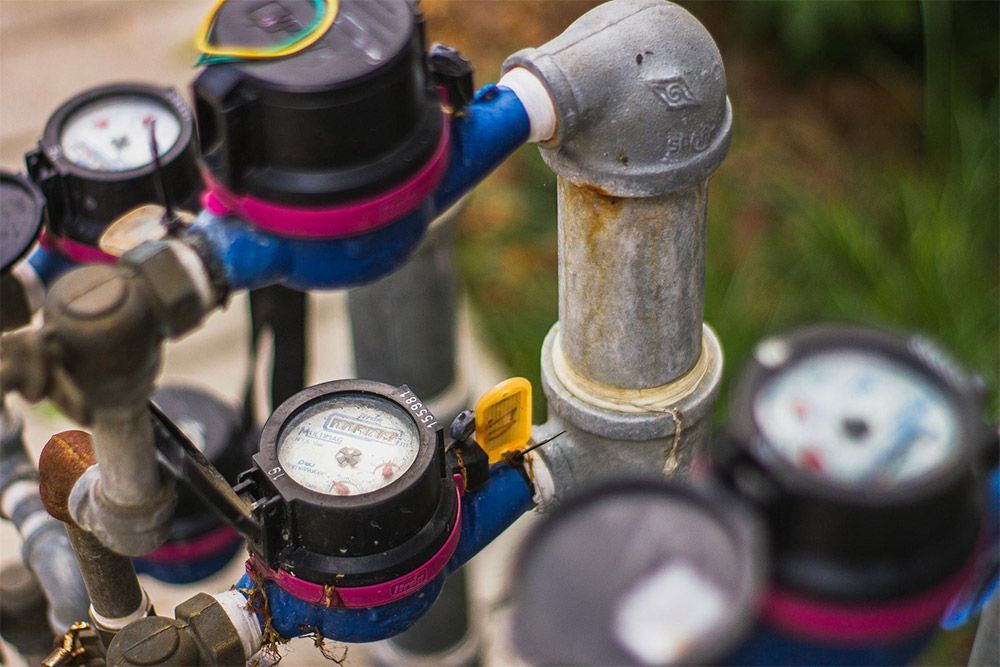Septic Tank Filter, Cleaning, Location & Replacement in Denver, How to Know?
Septic Tank Filter Cost in Denver

Septic tank filters are an essential part of the septic system. They are responsible for filtering out solid waste materials from the effluent before it enters the drain field. This is to prevent clogging and damage to the drain field.
Over time, septic tank filters can become clogged with solid waste materials, grease, and other debris. This can lead to a build-up of pressure inside the tank and cause it to overflow or back up into the house. Clogged filters can also result in foul odors and sewage backups, which can pose health hazards for you and your family. Regular cleaning of the septic tank filter is necessary to maintain the proper functioning of the septic system and avoid any potential problems.
There are a few signs that may indicate your septic tank filter needs cleaning. These include slow draining sinks and toilets, foul odors in and around the house, gurgling sounds coming from the drains, and sewage backups. If you notice any of these signs, it's essential to have your septic tank filter checked and cleaned if necessary.
How often Should You Clean Your Septic Tank Filter
Cleaning your septic tank filter requires some basic tools and materials such as gloves, a hose, a bucket, and a filter cleaning brush. Before you begin the cleaning process, make sure to turn off any power supply to the septic system.
Then, remove the filter from its compartment and rinse it with water to remove any loose debris. Use the filter cleaning brush to gently scrub away any stubborn waste materials. Once clean, place the filter back in its compartment and turn on the power supply.
Locating Your Septic Tank Filter
The location of the septic tank filter varies depending on the type of septic system you have. In some systems, the filter may be located inside the tank, while in others, it may be placed outside in a separate compartment. If you're unsure where your filter is located, it's best to consult a professional septic system technician.
How often Should You Clean Your Septic Tank Filter
Cleaning your septic tank filter requires some basic tools and materials such as gloves, a hose, a bucket, and a filter cleaning brush. Before you begin the cleaning process, make sure to turn off any power supply to the septic system.
Then, remove the filter from its compartment and rinse it with water to remove any loose debris. Use the filter cleaning brush to gently scrub away any stubborn waste materials. Once clean, place the filter back in its compartment and turn on the power supply.
Septic Tank Filter Replacement
Septic tank filters usually have a lifespan of 3-5 years, but this can vary depending on usage and maintenance. If you notice that your filter is damaged or beyond repair, it's best to have it replaced by a professional septic system technician. It's also recommended to replace the filter every 3-5 years as a preventative measure to ensure the proper functioning of your septic system.
As septic tank owners, it is essential to maintain our septic systems properly. One of the ways to ensure that your system is working efficiently is by installing a septic tank filter. This filter effectively removes any solid waste before it reaches the drain field, preventing blockage and other major issues.
While installing a septic tank filter may be considered an extra expense, the cost is significantly lower than the cost of repairing or replacing your entire septic system. The cost of a septic tank filter varies depending on the type and size of the filter. In the long run, investing in a septic tank filter can save you money while also protecting the environment.
The cost of a septic tank filter will vary depending on several factors, including the type of filter, size of the septic tank, and location. Generally, passive filters are more affordable than aerobic filters, but they may not be as effective for larger households or those with higher water usage. Additionally, the cost will also vary depending on the brand and quality of the filter.
Sand Filter Septic System Cost
If you're considering installing a sand filter septic system, it's important to factor in the cost. Sand filter septic systems can be an effective and eco-friendly option for wastewater treatment, but they do come with a price tag.
The cost of a sand filter septic system can vary depending on factors such as site conditions, system size, and installation requirements. Ultimately, the cost will depend on your specific needs and circumstances. To get an accurate estimate, it's best to consult with a licensed contractor who specializes in sand filter septic systems. Investing in a sand filter septic system can be a wise choice for both your wallet and the environment in the long run.
Coco Filter Septic System Cost
When it comes to septic systems, finding one that is both cost-effective and efficient is a top priority for many homeowners. Luckily, the Coco Filter Septic System is a great option to consider. Not only does it provide high-quality treatment of wastewater, but it also operates at a lower cost compared to traditional septic systems.
The cost of the Coco Filter Septic System will vary based on factors such as the size of the property and the location of installation, but overall it is a smart investment for those in need of a reliable and affordable septic solution. With the Coco Filter system, homeowners can have peace of mind knowing that their wastewater is being treated efficiently, effectively, and at a reasonable cost.
Septic Tank Filter Replacement
Replacing a septic tank filter is not a complicated process, but it should be done by a septic expert to ensure proper replacement and functionality. The filter should be placed in the outlet of the septic tank and secured according to the manufacturer's instructions.
A septic tank filter is an essential component of any septic system. As your septic tank accumulates waste and wastewater, the filter works diligently to remove debris and prevent it from entering your leach field. A properly maintained septic tank filter significantly reduces the risk of system failure due to clogging, which can save homeowners an enormous hassle and expense.
Cleaning Septic Tank Filter
The filter should be cleaned at least once every year, or more frequently if your household generates a lot of wastewater. With proper maintenance and regular cleaning, a septic tank filter can last for many years and prevent costly repairs or replacements. In summary, a septic tank filter is a crucial investment to maintain the longevity and effectiveness of your septic system.
A filter for septic tank is a crucial piece of equipment that ensures the proper functioning of your septic system. Filters work by preventing solids from escaping the tank and entering the drain field, which can cause clogs and even damage to your septic system.
Installing a filter in your septic tank is a cost-effective way to maintain your system's integrity, prevent costly repairs, and prolong its lifespan.
There are different types of filters available that cater to different tank sizes and household needs, so it's essential to consult with a professional to determine which filter is most suitable for your septic tank. By investing in a filter, you can rest assured that your septic system is running at peak performance and protecting your household's health and the environment.
Cleaning Septic Tank Filter
One of the key components of a septic tank is the filter. The filter helps to prevent large particlesfrom entering and clogging the drainage system, which could lead to system failure. It also helps to remove solid waste that may be present in the effluentbefore it reaches the soil.
There are different types of filters used in septic tanks, such as sand, fabric, or peat-based materials. These filters work by physically trapping solids or by promoting the growth of bacteria that break down the waste. Septic Tank Filters must be reguarly cleaned to function properly.
How To Clean Septic Tank Filter?
Maintaining a healthy and properly functioning septic system is essential for any homeowner. One crucial aspect of this upkeep is cleaning the septic tank filter. The filter is responsible for removing solid waste from the tank before it reaches the drain field.
Without regular attention, the filter can become clogged and cause backups and overflows. To clean the filter, first turn off the electricity to the septic tank. Next, locate the filter and remove it carefully from the tank. Use a hose to remove any debris and buildup from the filter.
Replace the filter and restore power to the system. It is recommended to clean the filter every six months to prevent potential problems and ensure the longevity of your septic system. Maintaining your septic tank filter is just one simple step in keeping your septic system functioning properly for years to come.
The Septic Effluent Filter is an important part of any septic system. It serves as a final treatment before the effluent is released into the soil absorption field. The filter is typically installed in the outlet baffle of the septic tank and prevents large particles from entering and clogging the drainfield.
One major benefit of using a septic effluent filter is that it helps to extend the lifespan of your septic system. By preventing solid particles from entering the drainfield, the filter reduces the chances of clogging and damage to your system. This can save you thousands of dollars in repairs or replacements in the long run.
Additionally, using a septic effluent filter can also help protect the environment. By filtering out solid particles, the filter helps to prevent contamination of groundwater and nearby bodies of water. This is especially important in areas where the soil is not suitable for treating wastewater or where there is a high risk of groundwater pollution.
In most cases, septic effluent filters require little maintenance. They can last for several years before needing to be replaced and are relatively easy to clean. Regular cleaning & maintenance, such as pumping the septic tank every 3-5 years, can also help to ensure the filter continues to function properly.
It is important to note that while a septic effluent filter is a beneficial addition to any septic system, it should not be
seen as a replacement for proper maintenance and cleaning. Properly disposing of waste and using water efficiently are still important factors in keeping your septic system running smoothly.

Best Septic Tank Effluent Filter
Maintaining a healthy septic system is important for any Septic tank owner. The best way to ensure the longevity and functionality of your septic system is by investing in the Best Septic Tank Effluent Filter.
With so many options on the market, it can be overwhelming to choose the right Effluent filter. That's why it's essential to conduct research and choose a filter that is durable, easy to install, and environmentally friendly. A good filter can prevent solids from entering your leach field and clogging it.
This can save you hundreds, if not thousands, of dollars on repairs or replacements. Don't wait until it's too late, invest in the best septic tank effluent filter for your home today.
A septic tank effluent filter is a device that is installed in the outlet pipe of a septic tank. Its main function is to filter out any solid particles and debris from the wastewater before it leaves the tank and enters the drain field. This helps prevent clogs and blockages in the pipes and drain field, which can lead to costly repairs and potentially hazardous situations.
Cleaning Effluent Filter Septic Tank
As a responsible homeowner, it is critical to regularly maintain and clean your septic tank's effluent filter. Keeping the filter clean will help prevent overflow and ensure that your septic tank works efficiently.
Routine cleaningincludes removing any debris that may accumulate on the filter, ensuring that it is installed correctly, and cleaning it thoroughly with water. It is crucial to have a septic tank expert inspect the filter at least once per year to ensure it is working correctly and make any necessary repairs or replacements.
Regular cleaning and maintenance of the effluent filter will help prolong the life of your septic system and prevent expensive repairs and replacements in the future.
Effluent Pumps for Septic Tanks
Effluent pumps are an essential part of septic tank systems, playing a crucial role in moving wastewater from the tank to the drain field. Without an efficient and reliable pump, septic systems can easily become overwhelmed, leading to costly repairs and potential health hazards.
At their core, effluent pumps are designed to handle the difficult task of moving raw sewage and other waste materials. As a result, they require professional installation and maintenance to ensure optimal performance and longevity.
Fortunately, with the right pump and proper care, septic tank owners can enjoy a reliable and efficient system for many years to come.
Best Septic Effluent Tank Filter
When it comes to maintaining a septic system, choosing the right filter for your effluent tank is crucial. The best septic effluent tank filter should effectively remove solids and other contaminants from the wastewater leaving the tank.
A high-quality filter will not only prevent clogs in your system but also help prolong its lifespan. It's important to consider factors such as the filter's efficiency, durability, and ease of maintenance when making your selection. With so many options on the market, it can be challenging to choose the right filter for your needs.
That's why it's crucial to do your research and consult with a septic system professional to ensure you make the best decision for your home or business. By investing in the best septic effluent tank filter and maintaining it regularly, you'll be able to keep your septic system running smoothly for years to come.
Effluent Filters For Septic Tanks
Effluent filters for septic tanks are an essential component in maintaining a healthy and functioning system. These filters are designed to prevent solid waste from flowing out into your drain field, helping to prevent potential blockages and costly repairs.
By filtering out solids, effluent filters ensure that your septic system can effectively treat wastewater and prevent harmful pollutants from entering groundwater. Regular maintenance of your filter is crucial to ensure its effectiveness and prevent malfunctions.
A septic tank professional will be able to recommend the best filter option for your septic system and can provide regular maintenance to ensure it’s working optimally. Trusting in the effectiveness of an effluent filter can bring peace of mind by protecting your septic system and ensuring a safe environment for your family and community..
Septic Tank Effluent
An effluent septic tank filter is a crucial component in a septic system and is responsible for a significant portion of wastewater treatment.
These filters provide an important line of defense against the discharge of potentially harmful substances from a septic tank into the surrounding environment. Essentially functioning like a fine mesh screen, an effluent septic tank filter provides an extra layer of filtration to ensure that the effluent leaving the tank is free of solids, suspended particles, and other impurities.
A properly installed and maintained effluent septic tank filter can significantly improve the overall performance and longevity of a septic system, ultimately benefiting both the environment and property owner.
Filter For Effluent Septic Tank
Septic tank filter systems are typically located between the septic tank and the drain field. The effluent from the septic tank flows into the filter system, where it goes through several layers of filtration. These layers consist of different materials such as sand, gravel, and synthetic fabrics that trap solid waste particles and allow only clean water to pass through.
Importance of a Septic Tank Filter System.
Effluent
Screen for
Septic Tank
Regular maintenance of a septic tank filter system is necessary to ensure its proper functioning. The filter media should be regularly cleaned or replaced, depending on the type of system. It is also essential to have the filter inspected and serviced by a professional at least once a year.
The septic system filter is a crucial component that helps to prevent septic failures and costly repairs. As a professional, it is essential to understand how these filters work and the importance of regular maintenance.
The septic system filter traps solid waste, preventing it from entering and clogging the drain field. Over time, these filters build up with organic matter, making it harder for waste to pass through and potentially leading to failure.
Proper maintenance includes cleaning or replacing the filter every one to three years, depending on usage. Regular inspections and cleanings can save homeowners thousands of dollars in repairs and keep septic systems running efficiently. As professionals, it is our responsibility to educate homeowners on the importance of septic system filter maintenance.
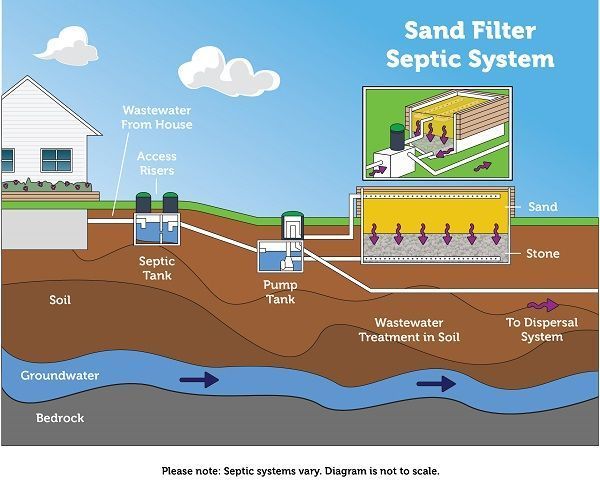
Sand Filter Septic System
Sand filter septic systems are quickly becoming the go-to option for those who live in areas without easy access to traditional sewer systems. These systems offer a cost-effective and environmentally friendly alternative to more traditional options.
The way they work is fairly simple, but incredibly effective. Waste is collected in a septic tank, where solids are separated and allowed to settle. From there, the remaining liquids are dispersed into a bed of sand and gravel, where bacteria break down organic material.
The end result is clean, filtered liquid that is safe to be dispersed into the environment. With their relatively low cost and low maintenance requirements, it's no wonder that sand filter septic systems are gaining in popularity among homeowners and businesses alike.
A septic tank sand filter is a type of wastewater treatment system that utilizes layers of sand and gravel to filter out harmful pathogens and contaminants from household sewage. It is commonly used in rural areas and small communities where traditional centralized sewer systems are not available.
The septic tank sand filter system consists of two main components: a septic tank and a sand filter. The septic tank is an underground, watertight container that holds the household wastewater for primary treatment. In the tank, solids settle to the bottom and form sludge while oils and grease float to the top and form scum. The remaining liquid, known as effluent, flows out of the tank into the sand filter.
A sand filter septic system is an environmentally friendly and efficient way to treat household wastewater. This type of system consists of a septic tank that collects sewage and a sand filter bed that treats the liquid effluent before releasing it into the soil.
Unlike traditional septic systems that use gravel or rock to filter wastewater, sand filters have a smaller footprint and require less maintenance. The sand media traps and removes impurities, such as bacteria and nutrients, allowing the cleaner water to flow back into the ground.
A sand filter septic system can provide reliable and long-lasting wastewater treatment for homes and businesses with limited space or challenging soil conditions.
A septic sand filter is an effective wastewater treatment system that uses sand to filter out impurities and reduce the amount of pollutants in domestic wastewater. This system is designed to remove contaminants such as organic matter, nutrients, and bacteria, and discharge clean water into the soil.
One of the main advantages of a septic sand filter is its cost-effectiveness, durability, and low maintenance. It is an environmentally-friendly option and can be installed in areas where soil conditions are not suitable for traditional septic systems.
Overall, a septic sand filter is an excellent solution for homeowners looking for an efficient and reliable method of treating their wastewater.
Maintaining a septic system is essential to ensure that it functions properly and effectively. Along with regular pumping, the septic sand filter must be cleaned periodically to prevent clogging and maintain the system's performance.
Septic sand filter cleaning is a complex process that requires professional expertise and specialized equipment. It involves removing accumulated solids and debris, flushing the system with high-pressure water, and carefully examining the filter for signs of damage or wear.
By keeping your septic sand filter clean and well-maintained, you can avoid costly repairs and prolong the lifespan of your system. Trust the professionals to handle this crucial maintenance task and ensure the continued health and safety of your septic system.
A septic tank carbon filter is a valuable addition to any septic system, especially for those households that prioritize environmentally friendly practices.
With its ability to effectively filter out harmful contaminants and odors from wastewater before it enters our ecosystem, the septic tank carbon filter has become a highly sought-after tool for eco-conscious homeowners.
By utilizing activated carbon, the filter captures and removes impurities while also reducing the potential for clogging and septic system failure. It's a simple yet effective solution for maintaining a healthy septic system and preserving our environment.
As professionals in the septic industry, we highly recommend the installation of a septic tank carbon filter for anyone seeking to prioritize sustainability and preservation.
Septic Tank Carbon Vent Filters
Septic tank carbon vent filters play a critical role in ensuring your septic system operates efficiently and odorlessly. These filters trap and neutralize hydrogen sulfide gas, which is the main culprit for unpleasant smells emitted from septic systems.
In addition, the filters prevent the release of this gas into the atmosphere, reducing environmental impact. Investing in septic tank carbon vent filters not only promotes a healthier and cleaner environment but also saves you money in the long run by reducing the need for costly septic system maintenance and repairs.
With various options available for different types of septic systems, it is essential to consult with professionals when choosing a filter suitable for your septic system's specific needs.
Carbon Filter Septic Tank Vents
In today's rapidly growing world, the importance of sustainable wastewater management is more significant than ever.
Carbon filter septic tank vents are an essential component in ensuring the smooth functioning of your septic system, while also minimizing the negative impact on the environment.
These vents use activated carbon to filter out harmful gases, particles and odors, thus preventing contamination and ensuring a high level of hygiene.
In addition to reducing the environmental impact, these vents also help reduce system maintenance costs and prevent problematic build-up that could lead to the failure of your septic system. Installing them will not only provide an effective solution to your septic system needs but also enable you to play your part in creating a greener world.
When it comes to effectively reducing the number of pollutants in your septic system, a septic charcoal filter can be a valuable addition to your home's waste management system. These filters work by removing impurities such as bacteria, chlorine, and other harmful chemicals before they enter the soil, which can help protect the health of your septic system and the environment.
The activated charcoal used in the filter adsorbs these pollutants, making it an ideal solution for homeowners who want to ensure that their septic system is functioning at its best.
Whether you're building a new home or looking to upgrade your current wastewater management system, investing in a septic charcoal filter is a smart choice that can help safeguard your property and promote a cleaner, healthier environment for everyone.
Charcoal Filter Septic Tank Vent
A charcoal filter septic tank vent has become a popular method for reducing unpleasant odors from septic systems. Unlike traditional vents that release the odor directly into the air, these vents use an activated charcoal filter to trap the gases and odor before dispersing a more pleasant scent.
This allows homeowners to enjoy their outdoor space without the intrusion of pungent smells. Additionally, charcoal filter septic tank vents require minimal maintenance, making them a cost-effective and convenient option for those seeking a solution to septic system odors.
By using this innovative technology, homeowners can now have peace of mind knowing that their septic system is not only functioning properly but also emitting a fresher, more pleasing scent.
Charcoal Filter For Septic Vent Pipe
Maintaining a septic system can be an overwhelming task for homeowners. Septic vent pipes play a crucial role in ensuring that the system functions properly.
However, these pipes can emit unpleasant odors that can make your living space unbearable. Installing a charcoal filter for the septic vent pipe is an effective way to eliminate these odors. This filter is designed to trap unwanted gases and odors before they make their way to the outdoor air.
Its effectiveness in reducing unpleasant smells makes it a popular choice among homeowners who want to improve their living conditions and do their part to protect the environment. With a charcoal filter for your septic vent pipe, you can breathe easy and enjoy the benefits of a well-maintained septic system.
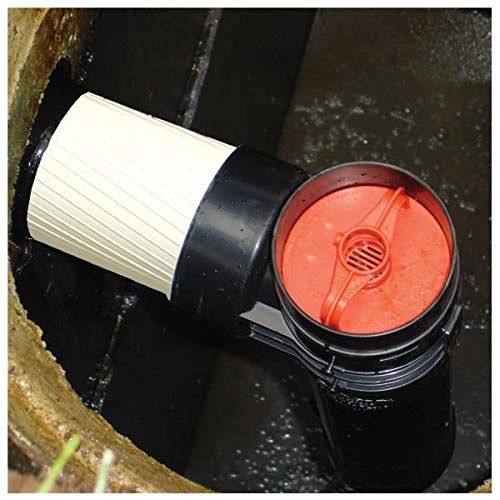
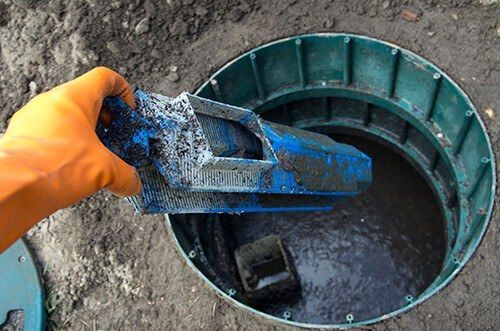
One important component of a septic tank is the Polylok filter. This filter is designed to prevent solids from leaving the tank and clogging up the drain field. In this document, we will discuss the functions of a septic tank Polylok filter, how it works, and its maintenance requirements.
The Polylok Septic Filter is a must-have when it comes to maintaining a properly functioning septic system. Made from durable materials and designed with a simple yet effective filtration system, this product is an essential component to ensure that your septic tank is operating at peak performance.
What sets the Polylok Septic Filter apart from other options on the market is its unique design that allows for easy installation and maintenance. Without proper filtration, solids and debris can build up over time, leading to blockages and system failures that can be costly to repair. Trust in the Polylok Septic Filter to keep your septic system running smoothly and avoid potential issues down the line.
The Polylok Septic Filter Installation
The installation of The Polylok Septic Filter is a crucial step in ensuring the proper functioning of a septic system. This innovative filter offers high efficiency in capturing solids and preventing them from entering the drain field.
It is designed to fit into existing 4-inch and 6-inch septic tees, making the installation process quick and easy. With its durable construction and low maintenance requirements,
The Polylok Septic Filter is an excellent investment for property owners seeking to prolong the life of their septic system. Trust in this reliable filter to keep your septic system running smoothly and efficiently..
The Septic Tank Coconut Filter is an innovative and eco-friendly solution for maintaining a healthy septic system. It uses natural coconut husks to filter out solid waste, reducing the amount of sludge in the tank and preventing clogs and backups.
Septic tanks are used in areas that are not connected to a public sewer system. They collect wastewater from homes and businesses, allowing it to decompose naturally before being drained into the soil. In order for a septic system to function properly, it is important to maintain and care for it regularly.
One of the main concerns with traditional septic systems is the buildup of sludge in the tank over time. This can lead to clogs, backups, and ultimately costly repairs. The Septic Tank Coconut Filter addresses this issue by using coconut husks, which have natural filtering properties.
Coconut husks are a byproduct of the coconut industry and are often discarded as waste. However, they have been found to be highly effective in removing solid waste from wastewater. The Septic Tank Coconut Filter takes advantage of this natural material, repurposing it for a beneficial use. This not only helps to reduce waste, but also provides an affordable and sustainable solution for septic system maintenance.
By installing a Septic Tank Coconut Filter in your septic tank, you can prolong the life of your system and avoid costly repairs. The filter works by trapping solid waste particles as they enter the tank, preventing them from settling at the bottom
and creating sludge buildup. This allows the effluent to pass through more easily and evenly distribute in the tank, promoting proper decomposition.
In addition to its filtering capabilities, the Septic Tank Coconut Filter also helps to increase oxygen levels in the tank. The coconut husks create air pockets which allow for better aeration, aiding in the breakdown of organic matter. This results in a healthier and more efficient septic system.
The Septic Tank Coconut Filter is easy to install and can be used in both new and existing septic tanks. It requires minimal maintenance, with the filter only needing to bereplaced every 3-5 years. This makes it a cost-effective solution for long-term septic system care.
The septic tank drain field is a crucial component of any septic system. It is responsible for the disposal of wastewater that has been processed by the septic tank. A properly functioning septic tank drain field distributes the treated wastewater evenly underground, allowing for further natural treatment and reduction of contaminants.
However, when a septic tank drain field fails, it can lead to unpleasant odors, sewage backups, and groundwater contamination. That is why it is vital to have your septic tank drain field inspected and maintained regularly by a professional to ensure its proper function and longevity. Don't wait until it's too late - invest in your septic system today.
A properly functioning drain field septic system is essential for maintaining the health and sanitation of any property that is not connected to a municipal sewer system. The drain field is responsible for dispersing treated wastewater through a series of underground pipes that allow the water to seep into the surrounding soil, where naturally occurring bacteria safely break down any remaining organic matter.
A malfunctioning or poorly designed drain field can result in a host of problems, from foul odors and standing water to potentially dangerous health hazards. For this reason, it is crucial to have regular inspections and maintenance of your drain field septic system to ensure the health of both your property and the surrounding environment.
No Drain Field Septic Systems have revolutionized the way wastewater is treated and disposed of in areas where traditional septic systems are not feasible.
These systems are designed to eliminate the need for a drain field, making them ideal for properties with limited space or soil conditions that are not suitable for traditional septic systems. They work by disinfecting the wastewater and releasing it into the environment, where it is further treated by natural processes.
This innovative technology has been gaining popularity as it reduces environmental impact, while providing an efficient and cost-effective solution for homeowners. With the ever-increasing demand for sustainable and eco-friendly solutions, No Drain Field Septic Systems are an excellent option for those looking for a reliable and environmentally-conscious alternative.
Septic System without Drain Field
A septic system without a drain field may seem like an unconventional choice, but it can be a practical solution for certain situations. In a septic system without a drain field, the wastewater is treated and disinfected in an aeration tank before being pumped into a disinfection tank where it can be safely discharged.
This method is often used in areas where space for a drain field is limited or where the soil is not suitable for a traditional drain field. While there are some limitations to this approach, such as increased maintenance and potential odor issues, it can be an effective and cost-efficient alternative for those facing specific environmental or space constraints.
It is important to work with a licensed and experienced professional to determine if a septic system without a drain field is the right solution for your needs.
Septic System Drain Field Pipe
When it comes to maintaining a septic system, one of the most important components is the drain field pipe.
This pipe is responsible for dispersing the treated wastewater from the septic tank into the soil, where it is further filtered and purified before joining the groundwater. Proper installation and maintenance of the drain field pipe is crucial to the overall function and longevity of the septic system.
It is important to ensure that the pipe is regularly inspected for any clogs or damage, and that any necessary repairs are made promptly. A professional septic system service provider can help you to maintain your drain field pipe and ensure that your system is functioning optimally, so that you can avoid any costly and disruptive issues down the line
When it comes to maintaining a healthy and functional septic system, there are many components to consider. One crucial aspect that often goes overlooked is the septic tank discharge filter.
This filter is responsible for preventing solids and other debris from flowing out of the tank and into the drain field. Without it, the septic system can quickly become clogged and lead to costly repairs and hazardous waste backups.
Choosing the right septic tank discharge filter for your system is crucial, as it must be capable of handling the specific needs of your household. Investing in a quality filter and regularly maintaining it can help ensure the longevity and proper functioning of your septic system.
Trust the experts to guide you in making the best decision for your septic tank discharge filter needs.
A septic tank vent filter is an important component in the maintenance and upkeep of a septic system. It plays a crucial role in preventing foul odors, gases and debris from entering your home through the plumbing system.
Septic tanks are designed to collect and treat wastewater from your household. They consist of two main parts - the septic tank and the drainfield. The septic tank acts as a primary treatment site for the wastewater, where solid waste settles to the bottom and is broken down by bacteria.
The remaining liquid is then discharged into the drainfield for further treatment.
However, septic tanks can also produce unpleasant odors due to the decomposition process of the solid waste. This is where a septic tank vent filter comes in. It is installed on the vent pipe of the septic system to trap and filter out any gases or odors that may escape from the tank.
Septic tank vent filters are usually made of activated carbon, which has a large surface area and high porosity. This allows it to effectively capture gas molecules and trap them within its pores, preventing them from entering your home.
Installing a septic tank vent filter is a simple and cost-effective way to eliminate foul odors and maintain the cleanliness of your home.
It should be regularly checked and replaced, as it can become clogged over time with debris and buildup.
In addition to filtering out gases, some septic tank vent filters also have added features such as UV protection and mosquito repellent. These additional benefits can further improve the overall performance of your septic system.
A well-functioning septic system is critical to the health and safety of households and communities. A crucial component of this system is the septic tank air filter, which helps keep the system running smoothly and effectively.
The filter works by preventing debris and other materials from entering the tank and clogging the system. This, in turn, helps prevent unpleasant odors and backups that can pose serious health risks.
A properly-maintained air filter can extend the lifespan of your septic system and ensure it remains effective for years to come. If you are in the market for a new septic tank air filter, it is important to choose a reputable manufacturer and to consult with a professional to ensure proper installation and maintenance.
Septic tank air filters work by creating an aerobic environment inside the septic tank. This is achieved by introducing oxygen into the tank through a vent pipe. The oxygen helps the aerobic bacteria break down organic matter in the septic tank, which is essential for proper functioning of the system.
Septic Tank Air Vent Filters
Septic tank air vent filters are an essential aspect of maintaining a well-functioning septic system. As the septic tank fills up with waste, gases such as methane begin to build up and can create foul odors.
A properly installed and maintained air vent filter helps to eliminate these unwanted smells while allowing air to flow in and out of the tank. These filters also prevent debris, insects, and other unwanted materials from entering the septic system through the air vent.
Proper maintenance of septic tank air vent filters ensures that your septic system operates efficiently and minimizes any risk of pollution. Overall, septic tank air vent filters are a cost-effective and practical solution for maintaining the health of your septic system.
Septic air pump filter is an essential component of any septic system to maintain the proper functioning of the aerator. As the name implies, it functions to filter out particles that can clog or damage the aerator and its parts.
Without this filter, the air pump can be compromised, leading to costly repairs and potential health hazards due to the malfunction of the septic system. I
t is crucial to ensure that your septic air pump filter is properly maintained and replaced periodically to ensure smooth operation of the septic system. By doing this, you can minimize the risk of malfunctions and avoid costly repairs in the long run.
A septic tank vent filter is an essential component of a home septic system. It is designed to remove odors and gases that accumulate in the septic tank, preventing them from escaping into the air. The filter also helps protect your health by reducing the risk of inhaling harmful fumes.
Why Do You Need a Septic
As septic tanks are used to store and handle waste water, it is important to keep them in proper working condition. One way of ensuring that the system is working efficiently is by using a filter for septic tank vent.
This filter prevents debris and other materials from entering the septic tank and blocking the system. These filters are essential for maintaining a healthy and safe septic system. It is recommended to clean and replace the filter on a regular basis to ensure optimal performance.
With the help of a filter and regular maintenance, you can keep your septic system running smoothly, preventing any potential health hazards and costly repairs.
he importance of a septic tank vent pipe filter cannot be overstated. This critical component of a septic system plays a vital role in preventing harmful gases from entering your home while simultaneously allowing the system to vent properly.
Without a proper filter in place, unwanted debris can accumulate in the vent pipe resulting in blockages and hazardous backup of toxic fumes. Regular maintenance of the filter is essential for the proper function of the septic system and can ultimately save homeowners thousands of dollars in repairs in the long run.
Choosing the right filter that is compatible with your system is key and consulting with a professional before installation is highly recommended.
Carbon Filters for Septic Tank Vent Filters
Carbon filters for septic tank vent filters are essential components of your septic system that help ensure your septic tank system's longevity, functionality, and safety.
These filters work by trapping and neutralizing harmful gases and odors, preventing them from being released into the air, and harming the environment and human health. Carbon filters for septic tank vent filters are usually designed to fit most septic systems and are incredibly easy to install.
They are made from high-quality materials, and with proper maintenance, they can last for years. If you are looking for a cost-effective solution to maintain your septic system's health, investing in carbon filters for septic tank vent filters is the way to go.
Septic Tank Carbon Vent Filters
Proper maintenance of your septic tank is essential to ensure its longevity and prevent any unpleasant odors or contamination. One crucial element of septic tank maintenance is the installation of carbon vent filters.
These filters, made of activated carbon, are specifically designed to remove odorous gases such as hydrogen sulfide from the air that is released through the vent pipes of your septic system. Not only do these carbon vent filters help to eliminate unpleasant smells, but they also help to protect the environment by preventing harmful contaminants from entering the atmosphere.
By utilizing septic tank carbon vent filters, you can ensure that your septic system operates effectively and efficiently while minimizing any potential negative impacts on your surroundings.
Septic tanks are an essential part of any residential or commercial building's waste management system. They provide a space for the separation and treatment of solid and liquid waste, ensuring that only clean water is released into the environment. However, to maintain the efficiency and longevity of a septic tank, it is crucial to have a proper filtration system in place.
One of the key components of a septic tank is the filter. It helps to prevent solid waste from entering and clogging the drain field, which can lead to expensive repairs and replacements. In this document, we will discuss the 4-inch septic tank filter, its purpose, types, installation, and maintenance.
A 4-inch septic tank filter is designed to trap solid waste particles and allow only liquid waste to pass through. Its main purpose is to protect the drain field from clogging, which can ultimately lead to system failure. The filter acts as a barrier between the septic tank and the drain field, ensuring that solid waste does not enter the drain field and cause any damage.
Septic Tank tee pipe with Filter 4 inch
The Septic Tank tee pipe with Filter 4 inch is a reliable and essential addition to any septic system. Designed for superior filtration and performance, this innovative tee pipe effectively removes unwanted debris and solids from the tank and prevents them from clogging the drain field.
With a diameter of 4 inches, this tee pipe is the perfect size for optimal flow and filtration while still allowing for easy installation and maintenance.
Whether you're in need of a new septic system or looking to upgrade your existing one, the Septic Tank tee pipe with Filter 4 inch is an excellent choice for ensuring a clean, efficient, and long-lasting system.
Septic Tank Filter Replacement
Septic tanks are a crucial part of many homes' wastewater management systems. They use natural processes to treat and dispose of household sewage, preventing harmful contamination of the environment.
One important component of septic tanks is the filter. This device prevents solids from entering and clogging the drain field, helping to maintain proper functioning of the system. However, filters can become clogged over time and need to be replaced.
Septic Tank Filter Installation
Septic tank filter installation is an essential part of septic system maintenance. When a septic system is functioning properly, the tank collects the wastewater and separates the solid waste from the liquid waste.
However, some of the solid waste may still escape into the drain field and clog the pipes, causing problems with the drainage system. To prevent this from happening, a septic tank filter is installed to catch any solids that have escaped from the tank.
A septic tank filter installation service can ensure that your filter is placed correctly and functioning effectively, preventing costly repairs and potential health hazards. It's an investment that every homeowner with a septic system should consider.
An external septic tank filter is an essential component of any septic system. This specially designed filter is installed outside the septic tank and helps to prevent solids from entering the drain field.
The filter is made up of a series of layers, which capture and trap debris. The use of an external filter reduces the frequency of septic tank pump-outs and also extends the life of the drain field. T
his filter is an eco-friendly solution that helps to protect the environment and keep the septic system running smoothly. As a professional in the industry, I highly recommend the use of an external septic tank filter to ensure the longevity and effectiveness of any septic system..
Septic System Services
- Have your septic tank pumped every 3-5 years to remove accumulated sludge and prevent clogs.
- Limit water usage and avoid excessive flushing of non-biodegradable items into the septic system.
- Be mindful of what goes down the drains in your house, such as grease, chemicals, and medications, as they can disrupt the natural balance of bacteria in the tank.
- Regularly inspect and maintain your septic system to catch any potential issues before they become major problems.
*
As septic system owners, we understand the importance of maintaining our systems properly. One crucial aspect of this maintenance is regular cleaning of the septic system filter.
A septic system filter is responsible for separating solids from wastewater, preventing them from entering the drain field. Over time, the filter can become clogged and ineffective, resulting in costly repairs and potential system failure.
To avoid these issues, it is essential to have a professional clean your septic system filter on a routine basis. This not only ensures the longevity and proper functioning of your system, but it can also prevent pollutants from entering our groundwater and harming the environment.
Don't wait until it's too late. Schedule your septic system filter cleaning with a licensed professional today.
Septic Tank Flush
One important aspect of maintaining a septic system is being mindful of what is flushed into it. Many household items, such as paper towels, feminine hygiene products, and cooking oils, can clog the system and should never be flushed down the toilet or poured down the drain. Instead, these items should be properly disposed of in the trash.
Another important factor in maintaining a septic system is water usage. Excessive water usage can overload the system, leading to backups and failures. To avoid this, be conscious of your water usage and try to conserve where possible. Fixing any leaks in plumbing or toilets can also help reduce water usage and prevent potential issues with the septic system.
Finally, regular septic tank pumping is crucial for keeping the system functioning properly. The
frequency of pumping depends on the size of your household and usage, but it generally recommended to pump the tank every 3-5 years. This removes accumulated sludge and scum from the tank, preventing buildup and potential issues with the system.
A septic tank screen is an essential component of a septic system that helps remove solid waste from the wastewater produced by households and commercial establishments. It serves as a barrier between the septic tank and the drain field, preventing any solids from entering the drain field which can disrupt its proper functioning.
The septic tank outlet screen may be small, but it plays a crucial role in ensuring that your septic system runs smoothly. This simple device is designed to prevent solids and debris from exiting the tank and clogging up your drain field.
Without a properly functioning outlet screen, your septic system could be at risk of failure and costly repairs. Regular maintenance and cleaning of the septic tank outlet screen can help prolong the lifespan of your septic system and prevent expensive problems down the line.
As a septic tank professional in the industry, it is my recommendation to have your outlet screen checked and cleaned by a licensed technician on a regular basis to ensure the continued efficiency of your septic system.
Septic tank pump screens are an important component of the septic system. These screens are designed to prevent solids from entering the pump and potentially causing damage or clogging the system.
Proper maintenance and cleaning of the screen can also prevent unpleasant odors and backups in the plumbing. Neglecting the maintenance of the septic tank pump screen can lead to costly repairs and the need for replacement of the septic system.
It is important to hire a professional to inspect and clean the screen regularly to ensure the proper functioning of the septic system. Taking care of this small component can have a big impact on the longevity and efficiency of the septic system.
Septic Tank Screen Cleaning is an essential task that should never be overlooked. A clogged or faulty septic tank screen can lead to expensive and messy disasters that are difficult to clean up.
Professional screen cleaning services are crucial in maintaining the longevity of your septic tank and preventing any malfunctioning by ensuring the proper and thorough cleaning of the screen. Septic experts are equipped with the right tools and expertise to inspect and address any issues that may arise during the septic tank screen cleaning process.
Trusting your septic tank screen cleaning to experts guarantees a successful and reliable result. Don't wait until a major problem emerges; schedule your septic screen cleaning service today.
A septic tank filter cover is an essential part of a septic system that helps prevent buildup and clogs in the septic tank. The cover acts as a barrier between the wastewater entering the tank and the outlet pipe leading to the drain field.
How does a Septic Tank Filter Cover work?
The filter cover is designed to catch solid waste and prevent it from entering the septic tank. This is important because if solid waste builds up in the tank, it can lead to clogs and backups in your plumbing system.
The filter cover also helps to evenly distribute the wastewater as it enters the tank, allowing for better filtration and treatment.
Types of Septic Tank Filter Covers
There are several types of filter covers available on the market, each with its own unique features and benefits. Some common types include:
- Mesh filter covers: These covers have a fine mesh screen that catches solid waste while allowing liquid to flow through. They are easy to install and can be cleaned or replaced as needed.
- Baffle filter covers: These covers have a baffle system that helps trap solids and redirect wastewater towards the outlet pipe. They are more durable than mesh covers and require less maintenance.
- Foam filter covers: These covers use foam material to trap solid waste while allowing liquid to pass through. They are easy to install and can be cleaned by simply rinsing with water
Septic Tank Filter Needs Cleaning
Aside from following a recommended cleaning schedule, it's essential to keep an eye out for signs that your septic tank filter needs to be cleaned. These may include:
- Slow draining sinks and toilets
- Unpleasant odors coming from drains or the septic system area
- Sewage backups in your home or on your property
- Wet or soggy areas near the septic tank or drain field
Septic tanks are used to treat and dispose of wastewater from a property without access to a public sewer system. They consist of two main parts: the septic tank itself and the drain field. The septic tank is where solids in the wastewater are separated from liquids, while the drain field is where the liquid effluent is treated and dispersed into the surrounding soil.
One important component of a septic tank system is the septic tank filter. This filter helps to prevent solids from entering and potentially clogging the drain field, which could lead to an expensive and messy problem. The location of the septic tank filter is crucial for its effectiveness in maintaining a properly functioning septic system.
The most common location for a septic tank filter is on the outlet baffle of the septic tank. The outlet baffle is the opening where effluent leaves the septic tank and enters the drain field. Placing the filter here allows it to catch any solids that may have made its way through the first chamber of the septic tank and prevent them from entering the drain field.
In some cases, the septic tank filter may also be located on the inlet baffle of the septic tank. This is the opening where wastewater enters the first chamber of the septic tank. Placing a filter here can help prevent any large solids from entering and potentially clogging the first chamber.
The location of a septic tank filter may also vary depending on the type of septic tank system installed. For example, in a pump chamber or aerobic treatment unit, the filter may be located on the pump itself rather than inside the septic tank.
It is important to note that the location of a septic tank filter should not be altered without proper consultation and approval from a professional. A licensed septic system contractor will know the best location for a filter based on the specific septic system installed and local regulations.
Regular maintenance of the septic tank filter is crucial for its effectiveness. It should be cleaned or replaced as recommended by a professional to prevent any buildup or clogging that could lead to issues with the septic system.
Where is the Filter on a Septic Tank
The location of the filter can vary depending on the type of septic tank you have. In most cases, it is found inside a small chamber attached to the main tank. Some tanks may also have an exterior filter, which is typically located near the outlet pipe.
To determine the exact location of your septic tank filter, it is best to consult with a professional or refer to your manufacturer's manual. It is crucial to know where the filter is located so that you can perform regular maintenance and cleaning to ensure its proper functioning.
Neglecting to clean or replace the filter when necessary can lead to major issues such as clogs, backups, and even system failure. Therefore, it is essential to understand the importance of the filter and its location within your septic tank.
Regularly maintaining and cleaning your septic tank filter will not only prevent costly repairs but also prolong the life of your septic system. It is recommended to have a professional inspect and clean the filter every 1-3 years, depending on the size and usage of your septic tank.
Where is My Septic Tank Filter Located?
As a homeowner with a septic tank, it is important to know the location of your septic tank filter. The filter plays a crucial role in maintaining the health and functionality of your septic system
Regularly checking and cleaning the filter can prevent major problems and costly repairs in the future.
Where is it Septic Tank Filter Usually Located?
The location of a septic tank filter may vary depending on the type and age of your septic system. However, it is typically located inside the septic tank, near the outlet pipe or baffle. In newer systems, the filter may be outside of the tank near the pump or distribution box.
How Do I Locate My Septic Tank Filter?
Septic tank filters are an essential component of maintaining your septic system. They play a crucial role in filtering out solids and preventing them from clogging up your drain field.
However, for homeowners, locating your septic tank filter can be a challenge. Knowing where to find it is the first step in ensuring that it remains clean and functioning properly. If you are unsure of its location, there are a few key areas to check.
Most filters are located near the outlet baffle, or where the effluent leaves the tank and enters the drain field. Additionally, some systems may have a separate access lid or an effluent pump that can lead you to the filter's location. With a little detective work, you'll be able to locate your septic tank filter and keep your system running smoothly for years to come.
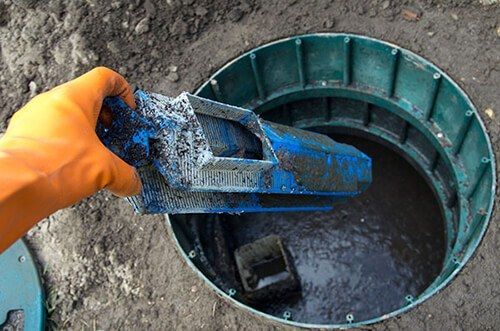
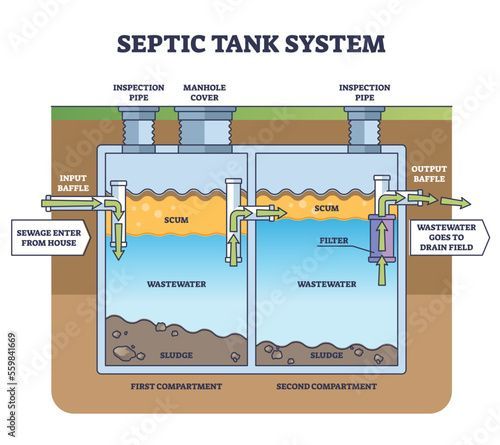
Welcome to this exhaustive guide on Septic Tank Filter Systems. A septic tank filter system is an integral component of the septic tank that helps in filtering out solid waste from the wastewater before it enters the drain field.
This process ensures that only clear and odorless water flows into the surrounding soil, making it safe for the environment.
The purpose of this guide is to provide you with all the necessary information about septic tank filter systems, including its working principle, types, maintenance, and benefits. So let's dive in!
Septic System Filter is integral to the health and functionality of home septic systems. This system ensures that wastewater enters the filter, which then separates solids from the liquid waste. This separated waste is then sent into the drainfield for further filtration.
However, without a filter in place, solids can easily clog pipes and other components of the septic system, increasing the risk of backups and potentially severe damage. It is, therefore, essential homeowners understand the importance of septic system filters and maintain them regularly to prevent expensive repairs in the future.
A well-maintained septic system filter ensures the longevity and healthy functionality of a septic system.
Septic Systems Filter Cleaning
Keeping your septic system well-maintained is essential to ensuring its longevity and effectiveness. One crucial aspect of septic system maintenance is ensuring that the filters are regularly cleaned.
Septic systems filter cleaning is necessary to prevent backups and clogs that could cause costly and unsanitary disruptions to your home or business. Investing in professional septic system filter cleaning services can save you time and money in the long run.
A qualified and experienced septic tank cleaner will conduct a thorough cleaning of your filters to remove any buildup and assess any potential issues. By regularly cleaning your septic system filters, you can rest assured that your system will operate at its best for years to come.
Bottomless sand Filter Septic System
The Bottomless Sand Filter Septic System is an eco-friendly and effective solution for wastewater management. This innovative technology uses the natural filtering capabilities of sand to remove impurities from the water before it is released out into the environment.
By eliminating the need for costly and invasive excavation of drain fields, the Bottomless Sand Filter Septic System ensures that your home's waste water is treated in an environmentally-conscious and efficient manner.
This system utilizes simple yet brilliant design principles to offer a reliable, low-maintenance alternative to traditional septic systems. Its efficiency, durability, and environmentally friendly characteristics make it a great option for homeowners who are looking for a sustainable and practical approach to wastewater management.
Septic Tank Filters Installed in Denver, CO
At Affordable Septic Pumping, we install septic tank filters and provide Septic tank maintenance. Specializing in septic tank pumping & filters, we can help you locate your septic tank filter, fast! With a team of master plumbers with over 20 years of combined experience in Septic tank service & Septic tank installation ,Septic tank risers & lids, Septic tank pumping, Septic tank cleaning, septic tank location services, septic tank baffle repair & replace, sewer and/or water line inspection in addition to repairs. Get your septic tank filters replaced by experienced septic tank installers. We have enjoyed the years spent serving the state of Colorado and all of the Denver area. Call us at 720-427-7557
A septic tank filter is an essential part of a septic system, responsible for removing solid waste and debris from the wastewater before it enters the drain field. However, just like any other filter, it can become clogged over time due to improper maintenance or excessive use.
A clogged septic tank filter can cause a lot of problems for homeowners and can lead to expensive repairs. It is important to address the issue quickly and efficiently, and seek the help of a professional.
A clogged filter can affect the overall function of the septic system and cause backups and blockages. Investing in regular septic system maintenance can prevent these issues from occurring in the first place.
If you suspect that your septic tank filter is clogged, it is crucial to contact a licensed professional as soon as possible to avoid further damage to your home and property.
A septic tank baffle clog is not only inconvenient but can also be a costly problem if not addressed promptly and properly. The baffle is a crucial component of a septic tank system, as it separates the solids from the liquid waste.
When it becomes clogged, it can cause the system to back up and overflow, resulting in backup and unpleasant odors. It's essential to have professionals assess the situation and determine the most effective course of action.
Neglecting the problem can lead to more significant and expensive issues down the line, so don't hesitate to seek help if you suspect a septic tank baffle clog..
Is My Septic Tank Full or Clogged
If you're experiencing issues with your plumbing draining slowly or backing up, you may be asking yourself, "Is My Septic Tank Full or Clogged?"
It's important to regularly maintain your septic system, as a full or clogged tank can cause serious harm to your household plumbing and cause potentially hazardous sanitary issues. While there may be several reasons for slow-moving plumbing, a full or clogged septic tank is a common culprit.
It's recommended to have your septic system inspected and maintained at least every three years by aseptic tank professionalto avoid any unpleasant surprises.
If you suspect an issue with your septic system, it's best to contact a septic tank professional as soon as possible to diagnose and resolve the problem before it becomes a major issue.
Clog Between House and Septic tank
A clog between your house and septic tank may seem like an easily fixable issue, but it's important to address it quickly and properly to avoid potential damage and health hazards. A septic tank professional or septic specialist should be called in to diagnose the problem and determine the best course of action. Whether the clog is caused by solids or tree roots, it likely means that wastewater is not properly flowing away from your home. This can lead to overflowing toilets and drains, foul odors, and possible contamination of your well or groundwater. With timely intervention and expert care, however, your septic system can be restored to optimal function and prevent further inconvenience and damage.r.
A clogged toilet can quickly become a frustrating and unpleasant problem for any homeowner. However, if you have a septic tank, the issue can become even more complicated.
A clogged toilet connected to a septic tank can lead to backups and even damage the septic system itself. In these situations, it is important to call a septic tank professional plumber who has experience working with septic systems.
They will be able to diagnose the cause of the clog and take the necessary steps to clear it while also preserving the health of your septic tank. By taking action quickly, you can avoid a costly and unpleasant situation.
Septic Tank Filter Keeps Clogging
Septic tanks are an essential part of a household's wastewater management system. These underground chambers collect and treat wastewater from homes that are not connected to a public sewer system. The septic tank works by separating the solids from the liquid waste, allowing the liquid effluent to flow into the drain field for further treatment.
The filter is a crucial component of the septic tank. It helps prevent solid particles from entering and clogging the drain field, which could lead to system failure. However, despite its essential role, a septic tank filter can sometimes become clogged, causing issues for homeowners.
A septic tank outlet filter is an important component of a septic system, responsible for filtering the wastewater before it enters the drain field. It is located at the end of the septic tank and filters out solid waste particles that can clog or damage the drain field.
The septic tank outlet filter works by trapping solid waste particles and allowing the filtered wastewater to pass through. It usually consists of a mesh or screen that is designed to catch larger particles such as hair, grease, and other solids. This prevents these materials from flowing into the drain field where they could cause clogging and damage.
Regular maintenance of the septic tank outlet filter is crucial for the proper functioning of a septic system. Over time, solid waste particles can accumulate in the filter and reduce its efficiency. This can lead to clogging of the drain field and cause backups and sewage overflow.
The frequency of cleaning or replacing a septic tank outlet filter depends on several factors such as the size of the septic system, number of occupants in the household, and overall usage. It is recommended to clean or replace the filter at least once a year, but it may need to be done more frequently for larger households or higher usage.
Septic Tank Outlet Filter Needs Cleaning or Replacing
Homeowners with septic tanks may have experienced the unpleasant issue of a clogged septic tank outlet filter. This critical part of your septic system is responsible for ensuring that solids and other debris do not infiltrate your leach field.
However, over time, the filter can become clogged, leading to sewage backups, unpleasant odors, and potential damage to your septic system. If you suspect that your septic tank outlet filter needs cleaning or replacing, it is crucial to reach out to a professional septic service immediately.
Failing to address the issue promptly can result in costly repairs and even health hazards for you and your family. So, don't wait until it's too late. Contact a septic tank professional today to ensure that your septic system is functioning properly and avoid potential headaches down the road
UpFlow Filter Septic Tank, also known as Upflow Anaerobic Sludge Blanket (UASB) Reactor, is a type of anaerobic wastewater treatment system. It uses a combination of physical, chemical and biological processes to remove pollutants from domestic or industrial wastewater.
This technology has been used for over four decades and has proven to be an efficient and cost-effective solution for treating wastewater.
Septic Tank Filter Removal
Septic tank filter removal is an important task that should be performed regularly to ensure the proper functioning of your septic system. Without a functioning filter, solids and debris can easily clog pipes and lead to costly repairs.
Removing the filter can be a delicate process and should be handled by a trained professional who knows how to properly clean and replace the filter. By keeping up with regular filter removal, you can help prolong the life of your septic system and avoid potential headaches down the road.
Trusting a Homeowners with septic tanks may have experienced the unpleasant issue of a clogged septic tank outlet filter. This critical part of your septic system is responsible for ensuring that solids and other debris do not infiltrate your leach field.
However, over time, the filter can become clogged, leading to sewage backups, unpleasant odors, and potential damage to your septic system. If you suspect that your septic tank outlet filter needs cleaning or replacing, it is crucial to reach out to a professional septic service immediately.
Failing to address the issue promptly can result in costly repairs and even health hazards for you and your family. So, don't wait until it's too late.
Contact a septic tank professional today to ensure that your septic system is functioning properly and avoid potential headaches down the road professional for this task means you can have peace of mind knowing that your septic system is running smoothly and efficiently.nally, proper use of your septic system can also help prolong the life of your filter and reduce the frequency of removal.
Septic Tank Filter Removal Tool
The upkeep of a septic system is crucial for maintaining the integrity of a home's plumbing infrastructure. One essential component to proper maintenance is the septic tank filter, which is responsible for preventing debris and solids from entering the drain field.
However, these filters can become clogged and require cleaning or replacement. This is where the septic tank filter removal tool comes into play. This specialized tool allows for the easy and efficient removal of the filter without the need for digging or disassembling the septic tank.
With the use of a septic tank filter removal tool, homeowners and professionals alike can confidently maintain their septic system and ensure optimal functioning.
How to Remove Septic Tank Filter
Using a septic tank filter removal tool is relatively simple, but it requires some caution and patience. Here are the general steps to follow:
- Locate the septic tank access point: The first step is to locate the access point for your septic tank. This is usually a concrete or plastic cover that provides access to the tank's interior.
- Open the access point: Use a screwdriver or other tool to remove the screws or bolts holding the cover in place and lift it off.
- Locate the filter: The filter is typically located near the outlet pipe of the septic tank. It may be a separate compartment or attached to the outlet pipe.
- Attach the removal tool: Insert the hook or claw of the removal tool into one of the holes on the filter, then twist and push it in until it latches onto something inside.
- Remove the filter: Slowly and carefully pull out the removal tool, along with the attached filter. The process may require some wiggling and maneuvering, but avoid using excessive force as this could damage the filter or other components.
- Clean or replace the filter: Once the filter is removed, you can clean it with a hose or replace it entirely if it's damaged.
- Reinstall everything: After cleaning or replacing the filter, reattach it to the removal tool and carefully guide it back into place in the septic tank. Then, reattach the access point cover.
Maintaining a septic system is an essential part of maintaining a healthy home, and a vital component of that system is the septic tank vent pipe filter.
This filter protects the system from clogging, and keeps it functioning correctly and efficiently. It prevents debris and solids from entering the septic system and obstructing the flow of wastewater.
Not only does it enhance the longevity of your septic system, but also protects your health and ensures that no harmful gases enter your home. Investing in a quality septic tank vent pipe filter is necessary to maintain the integrity of your septic system and ensure that your home remains safe and healthy.
Charcoal Filter for Septic Vent Pipe
A charcoal filter for septic vent pipes is a valuable addition to any septic system. This simple and cost-effective device helps to minimize unpleasant odors from the septic tank that can permeate the surrounding air and harm the quality of life for those in the vicinity.
The charcoal filter works by trapping and absorbing volatile organic compounds that are responsible for these unwanted odors. Further, installing and maintaining a charcoal filter for your septic vent pipe is a straightforward process that can be easily accomplished with the assistance of a septic tank professional.
Septic Pipe Vent Odor Carbon Filter
The septic tank vent pipe filter is installed directly on top of the vent pipe, covering the opening. As air passes through the filter, any debris and pests are caught in the mesh or synthetic material. This prevents them from entering the vent pipe and causing blockages.
Keeping your septic system running efficiently is vital to maintaining the health and sanitation standards of your home. One important component of your system that is often overlooked is the septic vent pipe filter.
The filter works to prevent debris and pollutants from entering the septic system, ultimately reducing the risk of clogs and damage. While it may seem like a small detail, investing in a high-quality septic vent pipe filter can save you time, money, and headaches in the long run.
As a septic tank professional in the field, I highly recommend regularly inspecting and cleaning your filter to ensure it is functioning properly. Contact me today to learn more about how to maintain your septic system and protect your home and community.
Septic Tank Tee Pipe with Filter
A septic tank tee pipe with filter is a crucial component in any septic system. It serves as an essential connection between the underground septic tank and the above-ground distribution box. .
The septic tank tee pipe with filter plays a crucial role in the proper functioning of a septic system. It acts as a barrier between the solid waste and the distribution box, preventing any clogs or blockages from occurring.
The filter within the tee pipe also helps to trap large particles that may cause harm to the drain field or damage the distribution box.
Septic Tank Tee Pipes with Filter 4 inch
Septic Tank Tee Pipes with Filter 4 inch provide an innovative solution for managing wastewater in residential, commercial, and industrial settings.
The filtration system ensures that the effluent from the septic tank is separated from the solids. This process helps to remove any impurities that may lead to clogging or other related issues.
Additionally, the 4 inch diameter of the pipes allows for easy flow and passage of wastewater, which reduces any back-up and improves overall system efficiency. These septic tank tee pipes with filters are a vital component for any septic system and can help to ensure that your system operates at peak performance for years to come.
Septic tanks are an essential part of every household's waste management system. They are designed to store and treat the wastewater generated from your home.
However, over time, these tanks can become clogged with solid waste, reducing their efficiency and causing unpleasant odors.
To prevent this from happening, septic tank sock filters are used. These filters are placed inside the septic tank and act as a barrier, preventing solid waste from entering the drain field.
In this document, we will discuss everything you need to know about septic tank sock filters, including their purpose, how they work, and why they are important for maintaining a healthy septic system.
Septic tanks are an essential part of any home that is not connected to a municipal sewer system. These underground, watertight structures are responsible for treating and disposing of household wastewater.
One popular supplier of septic tanks is Lowes Home Improvement. With over 2,000 stores across North America, Lowes offers a wide variety of products for home improvement projects, including septic tanks.
Lowes offers both traditional concrete and plastic septic tanks in various sizes to accommodate the needs of different households. These tanks are designed to collect and treat wastewater from your home's plumbing system, utilizing a process involving bacteria to break down solid waste and filter out harmful substances.
This treated liquid then exits the tank through a drainage system into a drain field for further filtration before being released into the surrounding soil.
Septic tanks require regular maintenance to ensure they continue to function properly.
Lowes not only sells septic tanks, but also a range of products and materials for maintaining and repairing them, such as drain field pipes, tank risers, and treatment chemicals. It is important to follow proper maintenance procedures in order to extend the life of your septic tank and avoid costly repairs or replacements.
In addition to providing products for maintaining septic tanks, Lowes also offers helpful resources and guides for homeowners on how to properly care for their septic systems. These include tips on water conservation, safe disposal of household chemicals, and signs to watch out for that may indicate an issue with your septic tank.
Lowes also offers installation services for septic tanks, making it a convenient option for homeowners who are not equipped to handle the installation process themselves.Their team of septic tank professionals ensure that the tank is placed correctly and connected to your home's plumbing system properly
A septic tank is an important component of any home's sewage system. It is a large underground tank that collects and temporarily stores waste from the house until it can be properly disposed of. The installation, maintenance, and repair of septic tanks require specialized knowledge and equipment. This is where Home Depot comes in.
Home Depot is a leading home improvement retailer that offers a wide range of products and services for homeowners. They are known for their high-quality products, competitive prices, and knowledgeable staff. Home Depot also has a dedicated team of professionals who specialize in septic tank systems.
Why choose Home Depot for your septic tank needs?
There are several reasons why Home Depot is the go-to destination for all your septic tank needs.
- Wide Selection of Products: Home Depot has a vast selection of septic tanks, pipes, and other necessary components for both traditional and alternative systems. This makes it easy to find the right products that fit your specific needs.
- Expert Guidance: The staff at Home Depot is well-trained and knowledgeable about all aspects of septic tank systems. They can help you choose the right products for your system, provide tips on installation and maintenance, and answer any questions you may have.
- Convenient Locations: With over 2,200 stores across North America, Home Depot is easily accessible to most homeowners. This means that you can quickly get the products you need without having to travel too far.
- Competitive Prices: Home Depot offers competitive prices on all their products and services, making it an affordable option for homeowners.
Septic Tank Filters Installed & Removed in Denver, CO
At Affordable Septic Pumping, we install septic tank filters and provide Septic tank maintenance. Specializing in septic tank pumping & filters, we can help you locate your septic tank filter, fast! With a team of master plumbers with over 20 years of combined experience in
Septic tank service &
Septic tank installation ,Septic tank risers & lids,
Septic tank pumping, Septic tank cleaning,
septic tank location services,
septic tank baffle repair & replace, sewer and/or water line inspection in addition to repairs. Get your septic tank filters replaced by experienced septic tank installers. We have enjoyed the years spent serving the state of Colorado and all of the Denver area. Call us at 720-427-7557
